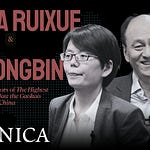This is a talk I delivered at Carnegie Mellon University on April 17, 2025. Full text follows!
How many times do we have to be shocked by China's technological achievements before we finally stop being shocked?
This latest trade war we now find ourselves in has focused American attention once again on China. And once again, we’re seeing across broad swaths of American society a sense of astonishment, of disbelief, of, well, shock — and in some quarters a disquieting reckoning with uncomfortable truths about relative power between the U.S. and China, especially regarding technological power.
More and more Americans are coming to grips with the reality that China isn’t just a low-cost manufacturer of shoddy, low-tech goods, leveraging cheap and plentiful labor to make socks, toys, and Christmas ornaments, but rather a global hub of advanced manufacturing that’s churning out the best electric vehicles, the most feature-packed smartphones, the most amazing and affordable humanoid robots, and drones, and some highly disruptive AI Large Language Models to boot.
So why are Americans continually surprised by Chinese technological achievements? Why did the advent of DeepSeek so blindside people in the U.S., especially those who pay close attention to tech and developments in generative AI?
Part of it, I’m forced to conclude, is about the hubristic confidence of so many Americans that certain domains are just ours to lead. These include cultural influence, scientific discovery, turning any location into a drive-through, and having impossibly white teeth — but another one we've just gotten used to dominating is technological innovation.
The sudden emergence of DeepSeek — and I'm using this as shorthand for a whole cluster of realizations about China's technological capabilities — isn't just about "surprise." For many Americans, it strikes at something even more fundamental to the American self-conception. There's something about China's rapid rise to become a near-peer, multidimensional competitor that fundamentally bothers Americans in a way that they often can't fully articulate. Something, as I've often said, just sticks in the American craw about China's rise.
This goes well beyond what the USSR represented during the Cold War, or what Japan represented in the 1980s. While they may have been military peers (the Soviet Union) or serious economic competitors (Japan), neither was both a military and economic competitor. China represents something unprecedented: a true multidimensional peer competitor, one that challenges us not just militarily or economically, but across the full spectrum of national power.
It’s not all that surprising, then, that China’s rapid ascent to technological parity would cause us considerable psychological discomfort — especially in the face of our efforts to starve China of key tech inputs, with strict export controls on things like the latest Nvidia GPUs, or the EUV lithography equipment they would need to manufacture semiconductors at advanced production nodes. The jury is out on how much these efforts actually did slow Chinese development, but what should be clear by now, I hope, is that these policies have lit a fire and created incentives for Chinese engineers — and perhaps just as importantly, financiers — to redouble their efforts. Personally, my bet is that a decade from now we’ll see that, just as with mobile payments, or 5G networks, or high-speed rail, China will have leapfrogged us. We’ll look back at the export controls and realize that this was a feckless policy that forced the frog to leap.
It’s also not at all surprising, given China’s remarkable surge happening at this moment of faltering American confidence, that there’s been an awful lot of copium being generated and consumed in America. DeepSeek, as I recently joked, seems to have touched off a genuine copioid epidemic in America. I’m not going to weigh in on technical matters about the extent to which DeepSeek distilled output from other LLMs in training, but boy it’s clear to me that there are a lot of people telling self-soothing stories to assure themselves that this was a fluke, or the result of IP theft, or unfair, market-distorting government intervention. This is a problem that goes all the way up to the top, and our failure as a nation to reckon with the reality has put us at a huge disadvantage in the current trade imbroglio.
We as a country need to have a good long think about why we’re perpetually surprised by Chinese progress. I should point out that this isn’t just about AI, but also renewable energy (where China has, for two years now, installed more solar and wind in a year than there was total in the rest of the world), in electric vehicles (where China makes and drives more than half the world's EVs, and they're both affordable and amazingly high-quality), and for some time now China’s high-speed rail network, its drones, its crazy tri-folding tablets that turn into phones, its super apps like WeChat/Weixin and Alipay.
How much does racism or orientalism come into play? The stereotype of Chinese people (and East Asians more broadly) as “copycats” or “automatons” lingers. East Asian classical musicians still suffer from this stereotype that while technically competent, they somehow lack “feel,” but blind auditions for orchestras prove that racial prejudice plays a big part in this. The idea that they somehow lack originality blinds us to abundant creativity and ingenuity.
One of the reasons why we’re perpetually surprised has to do with the way that we get our news about China. I don't believe that this is some deliberate smear job that "the Western media" is perpetrating against China. I think that there are really complex structural reasons that boil down mainly to how few on-the-ground reporters there are to cover such a vast and variegated country. But for now, I want to focus just on one aspect of what we get wrong in the way that we report on China, and thus in the way that we read about and understand China. And that is the fact that we have for so very long reported China as mainly a political story.
Think about, for those of you who remember, the way that the pandemic in China was reported: It went from "China screwed up and didn't transparently report the outbreak of this novel coronavirus, and that was because of its regime type — an authoritarian regime, you see, disincentivizes reporting up of bad news" in the early months of 2020, to "China is handling the spread of this virus impressively well while we've dropped the ball in America, and that's because of its regime type — an authoritarian regime, you see, is able to mobilize its massive state capacity for things like contact tracing, mass testing, and draconian measures like localized lockdowns," and then by early 2021 to "China is clinging to this pointless zero-COVID policy, and that's because of its regime type — an authoritarian regime, you see, generates enormous inertia and policies like zero-COVID take on a life of their own and the Party is addicted to the control it exercises," and then in November 2022, "China is on the brink of revolution because all these young people are protesting, and that's because of its regime type — an authoritarian regime, you see, is inherently brittle and all it takes is a few street protests to bring it all crashing down," to almost right away, "China has reversed its zero-COVID policy and lots of people are suddenly dying, and that's because of its regime type — an authoritarian regime, you see, can make sudden, arbitrary and inexplicable policy lurches like this, and hide all these deaths but we know better."
This doesn't even touch on the whole COVID-origins controversy, onto which all sorts of politics has constantly been projected. There was actually merit to some of these claims, and I certainly wouldn't argue that reporting something like the pandemic should have ignored the political angle. But that's basically all we had: There was very little reporting covering it from a purely public health perspective, for instance. But the fact is, our reporters in China are mainly trained to be political reporters.
So when it comes to writing about Chinese technology, too often stories about companies like Tencent, BYD, or Huawei are overshadowed by political narratives. Technological or industrial achievements are framed as outcomes of state policy, not business acumen or innovation.
To understand why this technological rivalry provokes such anxiety, we need to examine how China's ascent has systematically dismantled several of what I would call the “load-bearing pillars” of American exceptionalism. But first, let's talk about exceptionalism itself — both the American and Chinese varieties, because both countries have exceptionalist notions about themselves, similar in some ways but diverging in very, very important ways as well — because they frame our entire understanding of this technological competition.
American exceptionalism: You’ve all heard the phrase, yes?
Anyway, this idea of “exceptionalism” posits that our values and institutions aren't just unique, but universally applicable — valid for all people in all times. It's inherently proselytizing; we feel compelled to spread these values, sometimes with messianic fervor, occasionally at gunpoint. These aren't all necessarily negative impulses: consider the outsize sense of responsibility that Americans often feel (or did until fairly recently) — how we feel compelled to stand up for the oppressed and the wretched of the world. Though, alas, this also shades into our urge to bring the light of reason to the benighted and the sword of justice to those we deem wicked.
Chinese exceptionalism, by contrast, tends toward particularism. While China certainly sees itself as having a unique place and role in human history, it generally views its values and institutions as specific to China, the product of its unique history, geography, and society. Many Chinese take a perverse pride in how supposedly difficult their language is — where else are there TV shows built on the basic idea, "Look! Here are some especially clever foreigners who are actually able to speak passable Chinese!" The "inscrutable Oriental" is a racist archetype we all hoped would be condemned to the dustbin — yet even in the in-group, the idea that "It's a Chinese thing, you wouldn't understand" stubbornly persists.
This difference might seem academic, but it's crucial to understanding the tech rivalry. Because when China started succeeding in ways that violated our assumptions about how the world should work, it didn't just surprise us — it threatened our fundamental worldview.
Consider how many axioms of American exceptionalism China has knocked down in recent years. We believed, almost as an article of faith, that a successful market economy was only possible under a democratic political system. Along came China with its authoritarian capitalism and, as former Ambassador Chas Freeman once said, like that bumblebee that aerodynamic theory says shouldn't be able to fly, somehow it does anyway.
We had two major beliefs about the relationship between technology and politics, and also numbered among the axiomatic pillars of American exceptionalism. First, we believed that the democratization of tech — particularly social media — would sound the death knell for autocracies everywhere. Some of you were too young, but perhaps some of you remember how every uprising got labeled a "Twitter Revolution" or "Facebook Revolution"? That narrative completely inverted around 2016, after the disillusionment of the Arab Spring, the Snowden revelations, and Russian election interference. Suddenly, technology wasn't the great liberator but the faithful handmaiden to authoritarianism.
The second belief was about innovation itself. We were convinced that genuine innovation was only possible under conditions of political freedom — that the free flow of information and unfettered exchange of ideas were necessary prerequisites for technological advancement. As recently as 2013 and 2014, then-Vice President Joe Biden delivered several graduation addresses assuring audiences that because we Americans had freedom, we would always lead in innovation. Political liberty was thus seen not just a necessary condition but a sufficient one.
When we believed these things, we often had China in mind. From Bill Clinton, who laughed at Chinese efforts at internet censorship, joking that trying to censor the internet would be like “trying to nail Jell-O to a wall — good luck with that” to, a decade later, his wife Hilary, then serving as Obama’s Secretary of State, who made the promotion of internet freedom a major goal of American policy, and announced State Department funding for innovative technologies meant to break through China’s Great Firewall. When we spoke of political freedom as a necessary condition for innovation, we were also most often thinking of China. Being unfree, they could only copy, never create.
Until, quite suddenly, they could.
There are other pillars of American exceptionalism that China has weakened or entirely dismantled just by defying the assumptions inherent in those pillars. We were the world’s great champion of free trade, until suddenly China seemed to be outdoing us in that arena, and today pushing the idea of free trade agreements, even modest bilateral ones, is a non-starter with both parties in America. Perhaps the conspicuous folly of the Trump tariffs will shock us back into sense. But note that this was always all about China — the “China Shock” that supposedly suppressed wages, hollowed out American manufacturing, and flooded our shelves with cheap goods.
We were also dead-set against industrial policy — while practicing it often along the way, to be sure, but at least against it officially. The reason we cited was that it supposedly didn’t work: free markets, not governments, were supposed to pick national champions and steer investment into the right industrial sectors. But that, too, changed suddenly, and again this has been due entirely to China. Back in the Biden administration — can you remember that far back? — we were freaking out about China and then before we knew it we were embracing industrial policy, whether the Chips & Science Act or the Inflation Reduction Act — and we were embracing it without having had a national conversation about it. And while some of this may perish under Trump, we should probably note that his administration is allocating $500 billion to “Stargate.”
I’ve argued elsewhere that it’s this combination of sledgehammer blows to these pillars of exceptionalism, all delivered effectively by China, that has so badly weakened our confidence and made us so anxious and panicked over China. This growing pessimism over American exceptionalism is tied to a deep pessimism I’ve seen in America and much of the West toward technology — and that contrasts with the way tech is regarded in China. I would argue that China’s persistent techno-optimism really matters in China’s surging technology prowess.
Not long ago I interviewed one of the leading experts on AI in China, Jeff Ding, who teaches at George Washington, about his excellent book called Technology and the Rise of Great Powers. He puts forward a simple but quite persuasive argument that it isn’t actually the cutting-edge, zero-to-one miraculous innovation of the sort we imagine ourselves as Americans to be uniquely capable that is the true source of national strength. Rather, it’s the ability to diffuse technology throughout different industry sectors, to see it embraced and utilized. This is especially true with the really foundational “General Purpose Technologies” that define different industrial revolutions, from steam power to electricity to the digital revolution and the internet to, today, artificial intelligence. I agree with him. His book looks at how well institutions in different countries function in diffusing technology, and that’s certainly one important factor. But I wish he’d also talked about something else I think is also, and perhaps even equally, important in facilitating diffusion of technologies in a society.
In short, technologies are innovated, developed, deployed, and consumed within a social and cultural context, and I strongly believe that this context differs from nation to nation, and that this really matters. Attitudes toward technology, toward technologists — the stories we tell ourselves, the heroes we hold up, the fears or hopes we invest technology with — all of this matters. Here in the West, I believe for some time we've been in what I like to call our "Black Mirror" phase — deeply suspicious of tech's dark potential, worried about surveillance capitalism, concerned about AI's existential threats. Some of our most prominent technologists, from Bill Gates and Elon Musk to the late Stephen Hawking, have offered dire warnings about letting AI slip the leash. This is not by any means to say that such misgivings and concerns are misplaced. I think it’s important to be thinking about AI ethics and safety. But we have to be honest: our technopessimism does have an effect.
China, meanwhile, is still in its "Star Trek" phase, where technology represents progress, possibility, and improved lives. You just don't hear those dystopian warnings from their leading figures — and not primarily because of censorship, if that’s what you’re thinking. It's much more prosaic: For most Chinese people, technological advancement has correlated directly with improved living standards. The faster and more powerful your networked device became, the better your life got. While we've been wringing our hands about social media's effects on democracy, they've been watching their quality of life improve in lockstep with technological progress.
The societal attitudes toward technology in China are deeply rooted, and the impact of those attitudes is profound. When technologies are valued and technological prowess is seen as the key to national wealth, power, security, and dignity; when technologists enjoy respect, privilege, and handsome remuneration; and when the leadership itself truly prioritizes technology, this can supercharge a nation's tech sector. Such conditions prevailed in the U.S. in the decades after the Second World War, especially after Sputnik. And they've prevailed in China throughout the period of Reform and Opening, and to the present.
Consider education: China is on track to graduate about 12.2 million college students this year, up by a whopping 430,000 from the year before. These are four-year degree programs with a bachelor's degree or equivalent. Of those, yes, only about 16% are in a strictly-defined STEM field. The good news for America is that it actually has a higher percentage of STEM students graduating each year, but the total number of graduates is much smaller: only about two million a year from undergraduate programs, and so even with about 20% in STEM fields, China is graduating close to 2 million STEM students a year to the US’s 400,000. That’s five times as many.
Perhaps even more significant is the percentage of people in government who have four-year degrees in the natural sciences. China remains one of the most thoroughly technocratic countries in the world, with something like 75% of high office holders having bachelor's degrees or above in the natural sciences or engineering.
Another major factor I just can’t emphasize enough is the role of manufacturing in China's innovation ecosystem. One of my favorite thinkers on these things, a guy named Dan Wang, offers a brilliant metaphor: You could put someone in a state-of-the-art kitchen with incredibly detailed recipes, but without actual cooking experience, they'd struggle to make decent scrambled eggs. China today has an awful lot of people with serious kitchen experience, and they're using increasingly sophisticated equipment to create some remarkable new dishes.
This is particularly evident in a city like Shenzhen, where the entire technology value chain exists within a single ecosystem. It's hard to imagine unless you've seen it: Decades and decades of accretion and agglomeration, like a new star's gravity sucking in cosmic dust, have produced a tech supercenter unrivaled by any other geography on the planet. If you've dreamed up a new device, you can prototype and iterate with incredible speed. Your design house, your coders, and your contract manufacturers are all just a quick e-bike ride away. It's a virtually frictionless innovation environment that we simply don't have anymore in the United States.
But rather than learning from this, we've responded with policies aimed at hobbling China's technological advancement. We've convinced ourselves that if we can just keep certain technologies out of their hands — advanced semiconductors, AI-optimized GPUs — our technological supremacy will endure. This strikes me as both short-sighted and likely to backfire.
Remember that China's modern history has taught its leaders one lesson above all others: technological backwardness leaves you vulnerable to predation by more advanced countries. This lesson dates back to China's defeat in the First Opium War in 1842, and it remains deeply embedded in the worldview of China's leadership. So when we seek to hobble China's technological advancement, to kneecap China by preventing the export of advanced semiconductors and other technology products, there is a deeply felt sense of threat that awakens almost atavistic memories.
Consider how China approaches technological development today. While we can't and shouldn't try to replicate their authoritarian technocracy, we might learn from their prioritization of STEM education and their understanding of the crucial link between manufacturing and innovation. President Trump can't wake up one morning and decree that our brightest minds should stop designing crypto tokens and start doing hard science —actually it looks sometimes like he’s doing the exact opposite — but that's essentially what Xi Jinping has done: basically saying, “physicists should be doing physics,” and not working for quant hedge funds. The fact that the founder of DeepSeek, Liang Wenfeng, started off as a quant hedgie and pivoted after Xi Jinping cracked down on his ilk, to go on to create DeepSeek, is telling. By the way, he also shut down cryptocurrency mining and markets, and placed strict limits on online gaming.
The stakes in this contest are enormously high, touching everything from national security to climate change, from human rights to the future of Taiwan. As if perversely contrived by some capricious God of geopolitics, that one single island lying just 100 miles off the southeast coast of mainland China happens to be both the keystone of the global silicon arch and the biggest potential flashpoint in the U.S.-China contest. Last year, Bloomberg Economics estimated the cost of a war over Taiwan at $10 trillion — fully 10% of the global GDP. One of the authors confided to me that they think this grossly underestimates the actual likely cost.
But I worry that our response — born of moral panic rather than strategic thinking — risks creating the very future we fear most. We need what is called "strategic empathy" or “cognitive empathy” — the ability to understand how our actions look from Beijing's perspective, even if we don't accept their viewpoint as entirely valid. Our current approach has largely convinced China's leaders that we intend to keep their country down permanently, which is precisely the kind of conviction that could lead to dangerous miscalculation.
This brings us to some uncomfortable questions we must wrestle with: Can we make space in the world for, and ultimately accommodate or coexist peacefully with, a near-peer competitor with fundamentally different values than ours? How about a China that's actually wealthier, even more technologically advanced, or demonstrably more militarily powerful than the U.S.? What are we willing to sacrifice to maintain our primacy? Are we willing to forego wealth creation? Are we okay with curtailing our own freedoms? The civil rights of Americans who happen to be ethnically Chinese?
Looking ahead, the U.S. and China will remain the world's two tech superpowers for the foreseeable future. We're both so far ahead in the technologies that will determine future competitiveness: AI, quantum computing, advanced robotics, gene editing, new materials. These are precisely the areas where we most need international cooperation to establish standards, safety guidelines, and sensible regulation.
Instead, we're watching a technological divergence unfold that, I think any dispassionate analysis has to conclude, is just worse for everybody. It was already bad enough, with the tech export restrictions, but it’s only getting worse now during this ill-advised, self-harming trade war. There’s no doubt in my mind that China’s better equipped to weather this storm, and I could go off on a long tangent talking about why that’s the case.
The challenge before us isn't just about maintaining technological leadership — it's about finding a way to accommodate the rise of a technological peer whose success challenges some of our most cherished assumptions about how the world works. How we manage this challenge will determine not just the future of U.S.-China relations, but the course of the 21st century itself.
I fear that, to quite an extent, our attitude, our rhetoric, our policies, and our framing of the China challenge has turned China from a manageable problem to something genuinely intractable and far more dangerous than it might otherwise have been. Decades from now, we may look back and realize that we jumped the gun — that we used the leverage we had at a moment when China's threat was still notional, still just potential, and not yet real. That our fears of the possibility that Beijing might mobilize companies like Huawei or TikTok to the detriment of American interests, the possibility that Beijing might overtake us, actually prompted China to pour resources into its tech sector — and actually overtake us.
The irony is that if we did care to further the cause of universal values in China — if the goal really was to make China into a more open, tolerant, participatory, deliberative, and plural place — then there was nothing ever as effective in making progress toward that end than the active entangling of America's tech scene with China's emerging tech ecosystem beginning meaningfully in the 1990s. In the 20 years I was in China, I watched as this amazing cross-pollination took place, with so many of the founders of China's major internet companies drinking in the Gospel of Silicon Valley, creating enterprise culture directly patterned on what they saw in Mountain View, Sunnyvale, and Palo Alto. They built what was China's first meaningful "public sphere," where even with censorship in place, the information horizons of ordinary people expanded exponentially.
Now, more than anything else, I lament the opportunities both countries forsake as they continue down divergent paths. The divergence we're now watching unfold will leave the world a poorer, hotter, tenser, and more dangerous place — unless we all push back on the lazy narratives, reject the fearmongering, and expect more from the decision-makers we elect.
Thank you very much.












